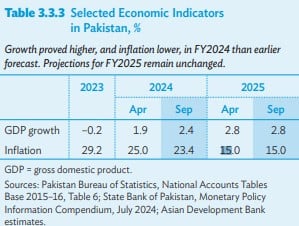Pakistan's GDP to grow at 2.8% in FY25 under IMF reforms: ADB
Economic prospects closely tied to steadfast, consistent implementation of policy reforms, says ADB official
The Asian Development Bank (ADB) on Wednesday projected Pakistan's gross domestic product (GDP) to grow at 2.8% in FY2025 — contingent on the tough reforms Islamabad assented to under the International Monetary Fund's (IMF) 37-month Extended Fund Facility (EFF).
In its Asian Development Outlook (ADO) September 2024 report, the ADB said the growth rebounded to an estimated 2.4% in the ongoing year due to reforms aimed at the nine-month IMF Stand-By Arrangement (SBA) which contributed to improved foreign exchange reserve and restored bilateral and multilateral inflows bringing economic stability.
The development comes ahead of IMF's executive board's meeting today (Wednesday) in which the Fund, as per Finance Minister Muhammad Aurangzeb, is expected to greenlight a $7 billion, 37-month Extended Fund Facility (EFF) for Islamabad.
Speaking on the country's future, the ADB's DB Country Director for Pakistan Yong Ye said that Islamabad's economic prospects were closely tied to the steadfast and consistent implementation of policy reforms to stabilise the economy and rebuild fiscal and external buffers.
Furthermore, the report also links economic growth to adherence to the reform agenda.
"It is imperative that Pakistan continues to consolidate public finances, expand social spending and protection, reduce fiscal risks from state-owned enterprises, and improve the business environment to encourage growth led by the private sector," said the ADB official while stressing the need for continued reforms.
Furthermore, the ADB pointed out that the inflation, which stood at 29.2% in 2023, has come down to 23.4 in the ongoing year and is expected to stand at 15% in FY25 due to "well-regulated monetary policy, reduced exchange rate volatility and stable outlook of international food prices".
This shrink in inflation, as per the ADB, was primarily due to decline in food price inflation due to an increased agricultural production
The inflation rate remained high in the first half of the fiscal year compared to the second.
A decrease in inflation and other positive indicators led to a decline in interest rates, the report added.
Additionally, the bank predicts that the financial deficit during the current fiscal year may be up to 8% of the GDP and that an increase in the said indicator will bring down the country's debt in proportion to the GDP growth.
Moreover, the outlook report highlighted that the burden of debt and interest payments has increased to 60% of the income revenue. However, it added that investment by the private sector will increase growth in the ongoing fiscal year.
Noting that the country was still facing an environment of tension economically and politically, the ADB called for strict financial regulation and the need to keep the exchange rate market-based.
-
Bitwise Crypto Industry innovators ETF: What investors should do in 2026?
-
Nintendo shares slide again as momentum fears grow
-
Gold, silver prices fallen sharply; What’s driving the drop?
-
Gold’s record climb: Experts question if its safety is ‘overstated’
-
Dubai unveils plans to construct street built with real gold
-
Netflix slams Paramount’s bid: 'Doesn't pass sniff test’ as Warner battle escalates
-
Ubisoft: Shares plunge amid restructuring plan and wave of games cancellations
-
Netflix revises Warner Bros. deal to $83 billion: All-cash offer













